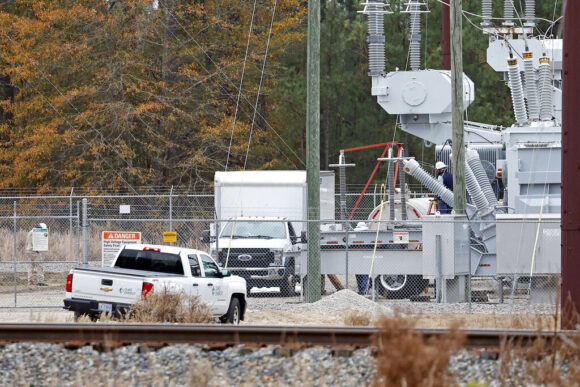Nearly three months after attacks on electrical substations caused a dayslong power outage in central North Carolina, a state Senate committee advanced legislation Tuesday that would stiffen penalties for intentionally damaging utility equipment.
The bill would create a new statute making it a high-grade felony to deliberately destroy or damage an energy facility – such as those involved in the transmission or distribution of electricity, fuel or another energy source – or attempt to do so. It passed the Senate Agriculture, Energy and Environment Committee on Tuesday and heads to the Judiciary Committee.
Introduced by Sen. Tom McInnis, a Moore County Republican whose district saw a peak of more than 45,000 homes and small businesses lose power in early December, the bill would partially replace a current law that makes utility damage a misdemeanor without jail time on a first offense.
It’s among a handful of proposals to enhance power grid protections in North Carolina and South Carolina amid a recent surge in substation attacks in those states and the Pacific Northwest.
McInnis described life-threatening circumstances that transpired last year as residents of his county struggled to stay warm and obtain necessary medical care in the four days it took Duke Energy to completely restore power.
“We don’t know how important our electric grid is until we lose it,” he said. “We had folks of course, ladies and gentlemen, whose health, whose life depended on the electricity to run their oxygen machines. We had life and death really in our own hands.”
With the proposed felony conviction, a person with no criminal history could serve just over six years in prison and face up to $250,000 in fines, according to a summary generated by the General Assembly’s nonpartisan staff. Prison terms could be longer for those with lengthy criminal records.
If the utility damage results in death, the offense would be punishable by up to 13 years in prison for those without a prior conviction, and just over 16 years for those with a record.
A person who is injured or whose property is damaged by a utility attack could also sue the perpetrator to cover the cost of related expenses.
Duke Energy spokesperson Jeff Brooks said the power company supports the bill and views its state government partnerships as essential to preventing future attacks.
The measure would go into effect Dec. 1, 2023, and apply to offenses committed on or after that date.
A similar proposal in South Carolina passed the state’s Senate Judiciary Committee this month but has yet to receive a floor vote.
Another North Carolina bill, introduced last month by Moore County Republican Rep. Ben Moss, would require utilities to provide 24-hour security at substations, which transform high-voltage electricity into the lower voltages that power communities.
___
Hannah Schoenbaum is a corps member for the Associated Press/Report for America Statehouse News Initiative. Report for America is a nonprofit national service program that places journalists in local newsrooms to report on undercovered issues.
Photo: A substation that was shot up, causing a power outage around Southern Pines, North Carolina, in early December. (AP Photo/Karl B DeBlaker, File)
Topics North Carolina Politics
Was this article valuable?
Here are more articles you may enjoy.



 Florida’s Commercial Clearinghouse Bill Stirring Up Concerns for Brokers, Regulators
Florida’s Commercial Clearinghouse Bill Stirring Up Concerns for Brokers, Regulators  US Appeals Court Rejects Challenge to Trump’s Efforts to Ban DEI
US Appeals Court Rejects Challenge to Trump’s Efforts to Ban DEI  Trump Demands $1 Billion From Harvard as Prolonged Standoff Appears to Deepen
Trump Demands $1 Billion From Harvard as Prolonged Standoff Appears to Deepen  Uber Jury Awards $8.5 Million Damages in Sexual Assault Case
Uber Jury Awards $8.5 Million Damages in Sexual Assault Case 

